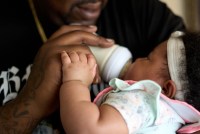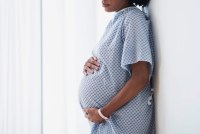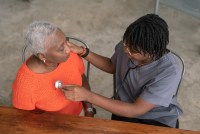Latest KFF Health News Stories
Amid Lack of Accountability for Bias in Maternity Care, a California Family Seeks Justice
April Valentine’s family wants to know whether racism could have played a role in her death. A KFF Health News analysis shows state regulators are ill-equipped to find discrimination in its many forms.
Mujeres negras sopesan riesgos emergentes de alisadores para el cabello “adictivos”
Los alisadores pueden contener carcinógenos, como agentes liberadores de formaldehído, ftalatos y otros compuestos que alteran el sistema endócrino, según estudios de los Institutos Nacionales de Salud.
Black Women Weigh Emerging Risks of ‘Creamy Crack’ Hair Straighteners
Social and economic pressures have long compelled Black girls and women to straighten their hair. But mounting evidence shows chemical straighteners — products with little regulatory oversight — may pose cancer and other health risks.
Meet the People Deciding How to Spend $50 Billion in Opioid Settlement Cash
As settlement dollars land at the state level, state councils wield significant power in determining how the windfall gets spent. And, though they will likely include the most knowledgeable voices on addiction, these panels also face concerns about conflicts of interest and other issues.
Idaho Drops Panel Investigating Pregnancy-Related Deaths as US Maternal Mortality Surges
Amid a years-long rise in maternal mortality rates in the United States, Idaho lawmakers decided to disband a committee created to investigate pregnancy-related deaths.
Cómo puede afectar a la atención médica el fallo de acción afirmativa de la Corte Suprema
La decisión dijo que es inconstitucional que los colegios y universidades usen la raza como un factor en la admisión de estudiantes.
How Health Care May Be Affected by the High Court’s Affirmative Action Ruling
Some medical professionals warn that the Supreme Court’s recent ruling against using race as a factor in admissions could have far-reaching implications for the diversity of medical students, the practice of medicine, and patient care. Here’s what you need to know.
New Charleston Museum Nods to Historical Roots of US Health Disparities
The $120 million International African American Museum that opened this week in Charleston, South Carolina, allows visitors to step back in history at Gadsden’s Wharf, where tens of thousands of enslaved Africans arrived in America, the genesis of generations of health disparities.
‘We’re Not Doing That’: Why a Black Couple Wouldn’t Crowdfund to Pay Off Medical Debts
Kristie Fields, a cancer patient in Virginia, was urged to go public to seek financial help. She worried about feeding hurtful stereotypes.
Advocates Call for 911 Changes. Police Have Mixed Feelings.
Though most California counties are experimenting with dispatching health professionals rather than law enforcement to respond to people experiencing mental health crises, powerful police unions fear defunding.
Black, Rural Southern Women at Gravest Risk From Pregnancy Miss Out on Maternal Health Aid
A federal program meant to reduce maternal and infant mortality in rural areas isn’t reaching Black women who are most likely to die from pregnancy-related causes.
Escasez crónica de salvavidas resalta desigualdades raciales
Cuando las autoridades locales toman decisiones sobre el cierre de piscinas o la reducción de horarios, lo hacen sabiendo que la natación tiene un tenso historial de desigualdades raciales.
Chronic Lifeguard Shortage Serves as Springboard to Address Racial Inequities
Cities and towns are again in deep waters this summer trying to hire enough lifeguards to open their public pools. Many are proceeding with sensitivity to issues of race and ethnicity.
Cardiovascular Disease Is Primed to Kill More Older Adults, Especially Blacks and Hispanics
Cardiovascular disease is the biggest killer of older Americans, with Black and Hispanic people at higher risk. Despite medical advances, researchers say, disparities are expected to worsen in the coming decades.
Mammograms at 40? Breast Cancer Screening Guidelines Spark Fresh Debate
There is no direct evidence that screening women in their 40s will save lives, yet modeling suggests expanding routine mammography to include them might avert 1.3 deaths per 1,000. Highlighting the risk of false positives, some specialists call for a more personalized approach.
La enfermedad cardiovascular podría matar a más adultos mayores hispanos
El dramático envejecimiento de la población de Estados Unidos y el número creciente de personas con afecciones como hipertensión, diabetes y obesidad —que aumentan el riesgo cardíaco— se espera que contribuyan a este escenario alarmante.
¿Mamografías a los 40? Nueva pauta para la detección del cáncer de seno genera debate
Algunos médicos e investigadores que están interesados en un enfoque más individualizado para encontrar tumores problemáticos se muestran escépticos y plantean preguntas sobre los datos y el razonamiento detrás del cambio radical del Grupo de Trabajo de Servicios Preventivos de Estados Unidos
California’s Fentanyl Problem Is Getting Worse
State lawmakers have recently been debating whether and how to stiffen punishments for dealers, while Gov. Gavin Newsom is targeting fentanyl trafficking and distributing more naloxone. The problem, experts say, is one with no easy or clear answers.
Se agrava la crisis del fentanilo en California
Impulsadas en gran medida por la prevalencia del fentanilo, un opioide sintético hasta 100 veces más potente que la morfina, las sobredosis de drogas en California matan ahora a más del doble de personas que los accidentes de tráfico.
A Striking Gap Between Deaths of Black and White Babies Plagues the South
Infant mortality rates across the South are by far the worst in the U.S. A look at South Carolina — where multimillion-dollar programs aimed at improving rates over the past 10 years have failed to move the needle — drives home the challenge of finding solutions, especially in rural communities.




















